De Schotse dichter Hugh MacDiarmid werd geboren op 11 augustus 1892 als Christopher Marray Grieve in Langholm. Zie ook alle tags voor Hugh MacDiarmid op dit blog.
Stony Limits (Fragment)
(In Memoriam: Charles Doughty, 1843-1926)
Under no hanging heaven-rooted tree,
Though full of mammuks’ nests,
Bone of old Britain we bury thee
But heeding your unspoken hests
Naught not coeval with the Earth
And indispensable till its end
With what whom you despised may deem the dearth
Of your last resting-place dare blend.
Where nature is content with little so are you
So be it the little to which all else is due.
Nor in vain mimicry of the powers
That lifted up the mountains shall we raise
A stone less of nature’s shaping than of ours
To mark the unfrequented place.
You were not filial to all else
Save to the Dust, the mother of all men,
And where you lie no other sign needs tells
(Unless a gaunt shape resembles you again
In some momentary effect of light on rock)
But your family likeness to all her stock.
Flowers may be strewn upon the grave
Of easy come easy go.
Fitly only some earthquake or tidal wave
O’er you its red rose or its white may throw
But naught else smaller than darkness and light
—Both here, though of no man’s bringing!—
And as any past time had been in your sight
Were you now from your bed upspringing,
Now or a billion years hence, you would see
Scant difference, eyed like eternity.
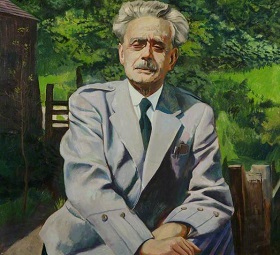
Hugh MacDiarmid (11 augustus 1892 – 9 september 1978)
Portret door Charles Pulsford, ca. 1975
De Duitse dichter Ernst Stadler werd geboren op 11 augustus 1883 in Colmar (Kolmar). Zie ook alle tags voor Ernst Stadler op dit blog.
Die Flucht
Worte
Man hatte uns Worte vorgesprochen, die von nackter Schönheit und Ahnung und zitterndem Verlangen übergiengen.
Wir nahmen sie, behutsam wie fremdländische Blumen, die wir in unsrer Knabenheimlichkeit aufhiengen.
Sie versprachen Sturm und Abenteuer, Überschwang und Gefahren und todgeweihte Schwüre –
Tag um Tag standen wir und warteten, daß ihr Abenteuer uns entführe.
Aber Wochen liefen kahl und spurlos, und nichts wollte sich melden, unsre Leere fortzutragen.
Und langsam begannen die bunten Worte zu entblättern. Wir lernten sie ohne Herzklopfen sagen.
Und die noch farbig waren, hatten sich von Alltag und allem Erdwohnen geschieden:
Sie lebten irgendwo verzaubert auf paradiesischen Inseln in einem märchenblauen Frieden.
Wir wußten: sie waren unerreichbar wie die weißen Wolken, die sich über unserm Knabenhimmel vereinten,
Aber an manchen Abenden geschah es, daß wir heimlich und sehnsüchtig ihrer verhallenden Musik nachweinten.
Gegen Morgen
Tag will herauf. Nacht wehrt nicht mehr dem Licht.
O Morgenwinde, die den Geist in ungestüme Meere treiben!
Schon brechen Vorstadtbahnen fauchend in den Garten
Der Frühe. Bald sind Straßen, Brücken wieder von Gewühl und Lärm versperrt –
O jetzt ins Stille flüchten! Eng im Zug der Weiber, der sich übern Treppengang zur Messe zerrt,
In Kirchenwinkel knien! O, alles von sich tun, und nur in Demut auf das Wunder der Verheißung warten!
O Nacht der Kathedralen! Inbrunst eingelernter Kinderworte!
Gestammel unverstandner Litanein, indes die Seelen in die Sanftmut alter Heiligenbilder schauen . .
O Engelsgruß der Gnade . . ungenannt im Chor der Gläubigen stehn und harren, daß die Pforte
Aufspringe, und ein Schein uns kröne wie vom Haar von unsrer lieben Frauen.
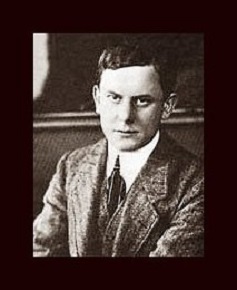
Ernst Stadler (11 augustus 1883 – 30 oktober 1914)
De Japanse schrijver Yoshikawa Eiji werd geboren op 11 augustus 1892 in de prefectuur Kanagawa. Zie ook alle tags voor Yoshikawa Eiji op dit blog.
Uit: Musashi (Vertaald door Werner Peterich)
„Zerknirscht entschuldigte er sich immer und immer wieder. Die ersten Male hatte Takezo das einfach mit einem “Schon gut!” beiseite gefegt. Als sie schließlich doch haltmachten, um sich auszuruhen, platzte er heraus: “Schau! Ich bin es, der um Verzeihung bitten müßte, denn schließlich war ich es, der dir all dies eingebrockt hat, oder? Weißt du nicht mehr, wie ich dich in meinen Plan eingeweiht habe, endlich etwas zu unternehmen, was Eindruck auf meinen Vater gemacht hätte? Ich habe mich nie damit abfinden können, daß er bis zum letzten Atemzug überzeugt war, aus mir würde nie was Rechtes werden. Und nun wollte ich es ihm beweisen. Ha!”
Takezos Vater, Munisai, hatte einst unter Fürst Shimmen von Iga gedient. Als Takezo hörte, daß Ishida Mitsunari eine Armee aufstellte, war er überzeugt, endlich sei die Chance seines Lebens gekommen. Sein Vater war Samurai gewesen. War es da nicht selbstverständlich, daß auch aus ihm ein Samurai wurde? Alles in ihm verlangte schmerzlich danach, endlich in die Schlacht zu ziehen, seinen Mut zu beweisen und dafür zu sorgen, daß sich die Nachricht, er habe einem feindlichen General den Kopf abgeschlagen, mit Windeseile in seinem Heimatort verbreitete. Verzweifelt hatte er gewünscht, beweisen zu können, daß er jemand sei, dem man Achtung entgegenzubringen habe, und daß er nicht nur ein Tunichtgut war, dem man nichts weiter zutraute, als Unruhe im Dorf zu stiften.
An all dies erinnerte Takezo Matahachi, und der Freund nickte. “Ich weiß, ich weiß. Aber mir war genauso zumute.”
Takezo fuhr fort: “Ich wollte, daß du mitkommst, denn schließlich haben wir immer alles gemeinsam gemacht.“
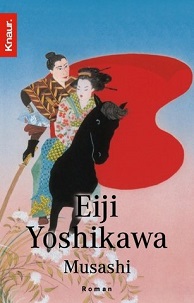
Yoshikawa Eiji (11 augustus 1892 – 7 september 1962)
Cover
De Spaanse schrijver, dichter, dramaturg en cineast Fernando Arrabal werd geboren in Melila, Spaans Marokko op 11 augustus 1932. Zie ook alle tags voor Fernando Arrabal op dit blog.
Uit: The Burial of the Sardine (Vertaald door Patrick Bowles)
“XXXVI
When Lis arrived, Altagora had already gone. Before I had even opened my mouth she sat down and began smoking a cigarette. She set it exactly half-way across her lips; it looked as if it were fixed there. She wasn t really smoking, but a wisp of smoke kept rising from the end She didn’t move. Then she put a kind of crest on her head which jutted out like a horn or an enormous finger-nail. She didn’t move; I saw the tears start into her eyes but she didn’t seem to be crying.
And I spoke to her, but she didn’t reply.
After a few moments she took off her clothes. There was a kind of mask drawn on her belly and the lips were those of her sex. There in the middle as if it were fixed there she placed the cigarette she had had in her mouth and the wisp of smoke kept rising.
And I spoke to her, but she didn’t reply.
After a few minutes she extinguished the cigarette and carefully undressed me. Then she took some carnations out of her bag and laid them on my back, below the kidneys. And I saw that tears were falling from her eyes which were not crying.”
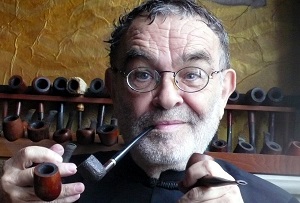
Fernando Arrabal (Melila, 11 augustus 1932)
De Amerikaanse schrijver en essayist Andre Dubus werd geboren op 11 augustus 1936 in Lake Charles, Louisiana. Zie ook alle tags voor Andre Dubus op dit blog.
Uit: Dancing After Hours
“Its sound in her soul was a distant fast train. Love did not bring happiness, it did not last, and it ended in pain. She did not want to believe this, and she was not certain that she did; perhaps she feared it was true in her own life, and her fear had become a feeling that tasted like disbelief.”
(…)
“There were three of these women, separated by short intervals of pain, remorse, and despair. When he and the last one had their final quarrel – she threw the breadboard – he was nearly fifty-five, and he gave up on love, save the memory of it. Always his aim had been marriage. He had never entered what he considered to be an affair, something whose end was an understood condition of its beginning. But he had loved and wanted for the rest of his life women who took him in their arms, and even their hearts, but did not plan to keep him. He had known that about them, they had told him no lies about what they wanted, and he had persisted, keeping his faith: if he could not change their hearts, then love itself would.”
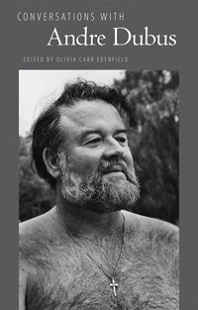
Andre Dubus (11 augustus 1936 – 24 februari 1999)
Cover
De Amerikaanse schrijver Alexander Palmer Haley werd geboren in Ithaca (New York) op 11 augustus 1921. Zie ook alle tags voor Alex Haley op dit blog en ook mijn blog van 11 augustus 2010.
Uit: The Shadowland of Dreams
« Many a young person tells me he wants to be a writer. I always encourage such people, but I also explain that there’s a big difference between “being a writer”and writing. In most cases these individuals are dreaming of wealth and fame, not the long hours alone at a typewriter. “You’ve got to want to write,”I say to them, “not want to be a writer.”
The reality is that writing is a lonely, private and poor-paying affair. For every writer kissed by fortune there are thousands more whose longing is never requited. Even those who succeed often know long periods of neglect and poverty. I did.
When I left a 20-year career in the Coast Guard to become a freelance writer, I had no prospects at all. What I did have was a friend in New York City, George Sims, with whom I’d grown up in Henning, Tenn. George found me my home, a cleaned-out storage room in the Greenwich Village apartment building where he worked as superintendent. It didn’t even matter that it was cold and had no bathroom. I immediately bought a used manual typewriter and felt like a genuine writer.
After a year or so, however, I stil l hadn’t gotten a break and began to doubt myself. It was so hard to sell a story that I barely made enough to eat. But I knew I wanted to write. I had dreamed about it for years. I wasn’t going to be one of those people who die wondering, What if?
I would keep putting my dream to the test — even though it meant living with uncertainty and fear of failure. This is the Shadowland of hope, and anyone with a dream must learn to live there.
Then one day I got a call that changed my life. It wasn’t an agent or editor offering a big contract. It was the opposite — a kind of siren call tempting me to give up my dream. On the phone was an old acquaintance from the Coast Guard, now stationed in San Francisco. He had once lent me a few bucks and liked to egg me about it.
“When am I going to get that $15, Alex?” he teased.“
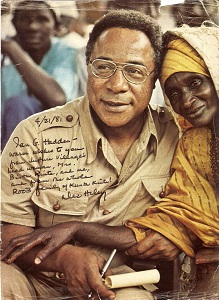
Alex Haley (11 augustus 1921 – 10 februari 1992)
Zie voor nog meer schrijvers ook mijn blog van 11 augustus 2011 deel 2.
